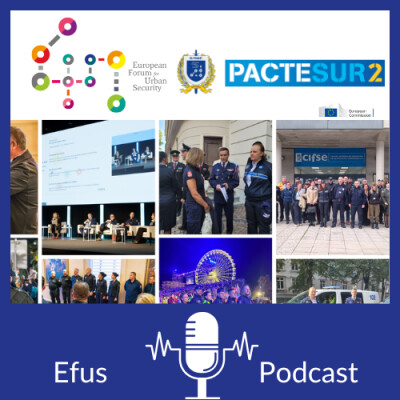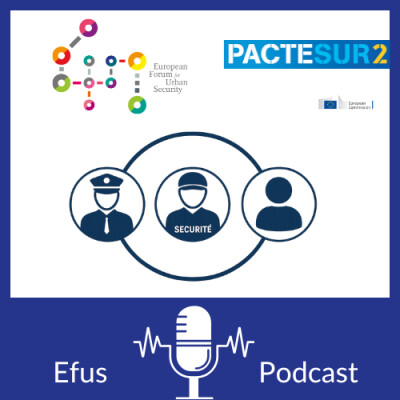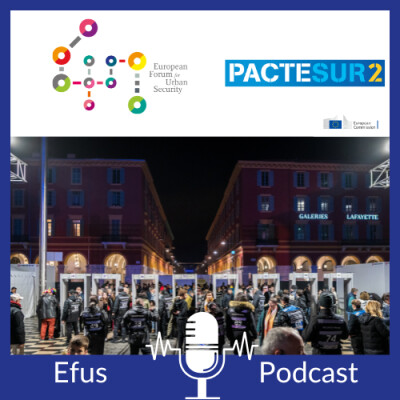- Julie Martin
Hello and welcome to the Efus podcast. I'm Julie Martin, journalist for the European Forum of Urban Security. Today we have a compelling episode lined up for you, featuring insights from representatives of our member cities who recently gathered for a dynamic workshop on the security continuum of the PACTESUR2 project. During this workshop, Stanislas Sheiko, head of strategic planning at Riga Municipal Police, unveiled some high- opening statistics from a survey of 507 police officers in Riga. Did you know that a staggering 63.8% of respondents feel that society doesn't adequately value their work? Even more striking, 44.2% of them choose not to disclose their profession when meeting new people feeling ashamed of their work. To deepen our understanding, we also asked representatives from various Efus member cities present at the seminar about their feelings and experiences regarding police perception in their own communities. Let's get started.
- Andrea Gonçalves
My name is Andrea Gonçalves. I am a commissioner in the Municipal Police of Lisbon. I am the commander of the community policing squad. I think that the population perception of the work of the municipal police in general is good. It's normal that some people don't like it very much. when we have to issue traffic fines or inspections. But they know that when they need help, we are there to help them.
- Peter Borko
My name is Peter Borko and I am head of communication of municipal police of Bratislava. I think that the image of municipal police is getting better. My opinion is that Eastern European countries have a big problem in perception of police forces because communism and the police force is tool of... communist government. Now, after 30 more years after the fall of the Iron Curtain, we still I think fighting for a better name and it is very important to show our work to people. That we are saying to serve and help is true.
- Leszek Walczak
My name is Lezek Walczak. I'm a head of municipal police from Gdańsk, Poland. It's been changing gradually. After many years, over 30 years of our service for them, I think I'm convinced that people trust us and cannot imagine life without us because we deliver them order and security. The data which was presented during our meeting, it was on Riga municipality. But I can assure that we have, to some extent, very similar problems. It's related to the past period in our history that when the police officer represents, let's say, the party, communist party, and it's difficult to change their attitudes.
- Christian Tesson
I'm Christian Tesson, director of strategy, finance and innovation for the local police in Liege. In Liege, people generally feel close to their police and overall they value the work we do. But of course, it depends. There are different segments of the population and depending on the situation, Police actions can be more or less appreciated. That said, working in the field today is definitely more challenging than it used to be. Officers are constantly being filmed. Everything ends up on social media or TV. So yes, that can make things quite complicated. One of our core values is respect, but mutual respect. That means respect from police officers toward citizens and also the other way around. But it also means that officers must respect procedures, the reasons they chose this job. and the people they serve.
- Sarah Blanchon
I'm Sarah Blanchon. I'm a senior officer in the municipal police of Nice, and I'm in charge of the operational command unit within the department. About what was said earlier, well, I don't really share that view. I think the municipal police are actually quite well regarded overall. And one thing's for sure, municipal officers are proud of what they do. That's undeniable. If I had to point to a real challenge we're facing, it would be how quickly our role is evolving. We're seeing a real shift in responsibilities. and we need to make sure we hold on to our core missions. Let me explain. Right now, the state is clearly struggling to keep up, and we can all see it. The national police are overwhelmed by mandatory tasks, and they no longer have the resources to maintain that direct link with the public. So, naturally, that falls to the municipal police, because we are, by definition, a contact force. But the reality is, as the number of interventions keeps rising, there's a risk that our teams get pulled more and more into highly technical, operational responses at the expense of our local presence.
- Julie Martin
And speaking of that, what measures have been implemented to strengthen the ties between the police and the community?
- Speaker #6
I'm the head of Tallinn Municipal Police in Estonia. For us it's a little bit different than here in France, because Estonian Municipal Police does not act exactly as a police, because we don't have all the powers like the national police have, like we cannot carry a weapon, we don't have any handcuffs. So this is a little bit different, but I think the main goal is pretty much the same. we are trying to ensure the public safety, public order. And of course, right now, the main goal is resilience of the city in time of crisis. Like as a regular police, we have the police patrols all over the city 24-7. We have a 24-7 response. Of course, we have this crisis mechanism. We are the holders of the city's so-called crisis materials, like food and beds and things like that. And of course, on the other hand, we work really hard that the politicians understand. We need some extra rights to be more efficient on the streets.
- Christian Tesson
What kind of actions are we putting in place? One key focus is our work with schools. It gives our prevention teams a chance to show a different side of policing, to explain why certain actions are taken, and help children, who'll one day be responsible adults, understand both the rights and responsibilities involved when it comes to police intervention. We often face situations where citizens interfere during police operations. and that can be particularly difficult to manage. We've also launched an initiative called Plubelle MaVille My City Made Better. It's a citizen engagement app where residents can report local issues bad smells, illegally parked cars, fallen street signs. Everything gets routed through a central hub, then sent to the appropriate department to be dealt with.
- Peter Borko
We started to work more with, for example, social media. The journalists are friends, so we want… to cooperate with them to show people through media our everyday work. A lot of people think about for example municipal policemen and police women like about people who just deal with traffic like bad parking or something like that. The things we deal in daily basis is much more bigger. The public safety concern a lot of things and we must present to our citizens what we are doing in in the streets. and this is the main goal for us.
- Andrea Gonçalves
One measure we have to get closer to the community is the community policing program, which already exists in 15 neighborhoods in the city of Lisbon. It is a special policing model which allows the community to participate in solving their own problems. It is a policing with daytime patrols, always carried out by the same two police officers in each neighborhood, which allows us to better understand the populations and its problems. And this helps to improve the relationship of trust between police and citizens.
- Sarah Blanchon
Our goal today is to bring the focus back down and to remind our officers that their first mission is that direct, day-to-day connection with residents. What really bothers people? It's when you walk out your front door and there's someone drinking right at the bottom of your building. It's when you're trying to sleep and there's noise or disturbances just outside. That's the kind of issue we need to keep. at the center of our work. And I truly believe that the strength of the municipal police, something we clearly saw during the October 29th attack, is that territorial network, that responsiveness, that proximity. That's what allowed our officers to intervene so quickly and courageously.
- Julie Martin
And what about the key takeaways from the experiences shared by other cities in this field?
- Sarah Blanchon
What I see, whether you're in Riga, Madrid, Gdansk, or here in Nice, is that we're all facing the same issues. And we're all trying, each in our own way, to learn from one another and bring the best ideas back home.
- Peter Borko
A lot of information we heard here are very important for us because they give us opportunity to think about police forces all. For example, about how policemen in Riga think about the relationship of citizens to them. I think we should talk more with policemen about their well-being, for example. how they feel in work, what they like, what they don't like, what we can do for them.
- Christian Tesson
We learned a lot, especially from the Baltic countries. They emphasized how crucial it is to focus on children and young teenagers, because they're the ones who will carry forward a new image of the police over time. So all these exchanges of best practices have been really valuable. What we've also realized is that, in the end, there's rarely anything completely new. Many things have already been tried. But what does make the difference is how you implement them. The communication channels you choose, the approach you take. That's where the real insights lie.
- Speaker #6
I think conferences like this one is really important. First of all, the networking is really good because we can share best practices, we can get to know each other. But if you talk about the municipal police in Nice here, it's really remarkable because they are quite a big force. They are really visible on the streets. I think the trainings, everything is in a really high level and the cooperation with the national police and with the private security companies, It's very good. I think the main thing is again to go back, tell our politicians that all over Europe the municipal police is, think about as a police force and they have the exact powers to be more efficient.
- Leszek Walczak
For us it's quite ridiculous every month we meet with residents from every district and we discuss all issues related with not only order and security, but we are not going to finish on discussion. try to establish the expectation, trying to sign some goals. And additionally, we evaluate it and we show our citizens what we have done in this sphere. In our case, we try to create a system which covers the public and private sectors as well, because it's impossible to imagine contemporary security, safety of security, and our citizens without knowing that there are other entities, unions, and even citizens. play a enormous role for the system. Coming here we are practitioners so we are looking for practitioner ideas. Maybe it looks like a theoretical meeting but this I wouldn't say this is the main issue. We try to find and implement some practical solutions. For example today when Jean-François mentioned about the task group. I'm also keen on such an idea. A task group which means that some problems can be solved by high professional specialists. And it shows that the specialists are better than police officers who are responsible for everything. So I am familiar with the idea because I am a former marine officer, so we know it brings results. People expect results, so we, of course, we should communicate them, know their needs, but there is nothing better to build trust, to do something visible for them.
- Julie Martin
To wrap things up, let's hear a final word about EU Polnet, the European network of local police launched within FUS in November 2023.
- Jean-François Ona
I'm Jean-François Ona, and I'm a security advisor to Veronique Boré, who is the Deputy Director General in charge of community relations, security, and citizenship for the city of Nice. EU Polnet is a project launched by Nice. The idea came from something simple. Police officers... especially during their training or time in police academies, really enjoy meeting and sharing best practices. But we also realized that most European and international police networks were heavily focused on state police forces. So we thought, why not bring the voice of local police forces to Brussels? Local police matter across Europe. Many of our partner cities have large and well-structured local forces. So we created EU Polnet as a network to carry that voice. Within IFUS, within the Forum. It aims to promote those exchanges, but also to attract new members. That way we keep the forum dynamic and give local police forces a stronger voice at the European level. And yes, it's specifically focused on local police, whether they're municipal or not, because not all local forces are municipal, but they do operate at the local level.
- Leszek Walczak
EU Polnad is a good idea. I would say it is a kind of answer for search. of other cities and countries how the new modern municipal police should look like. In Poland, in Latvia and some other counties, this kind of unity reaches the the higher level but to find inspiration it is essential to exchange some knowledge and daily view and it is really worth to to invent some something with them to work because we know what we are talking about the elements but we know each other and we know the practice how it works really i just say this we won't get there alone and there's a saying i really like if you want to go fast go alone if you want to go far go together that's it what
- Julie Martin
a fantastic conclusion to this episode a big thank to sarah and all our guests for sharing the insights and experiences which are at the heart of his priorities This episode is funded by the European Commission in the framework of the PaxU2 project. We can't wait to bring you another exciting episode of the EFUS podcast soon. Don't forget to subscribe so you don't miss out. See you next time.





